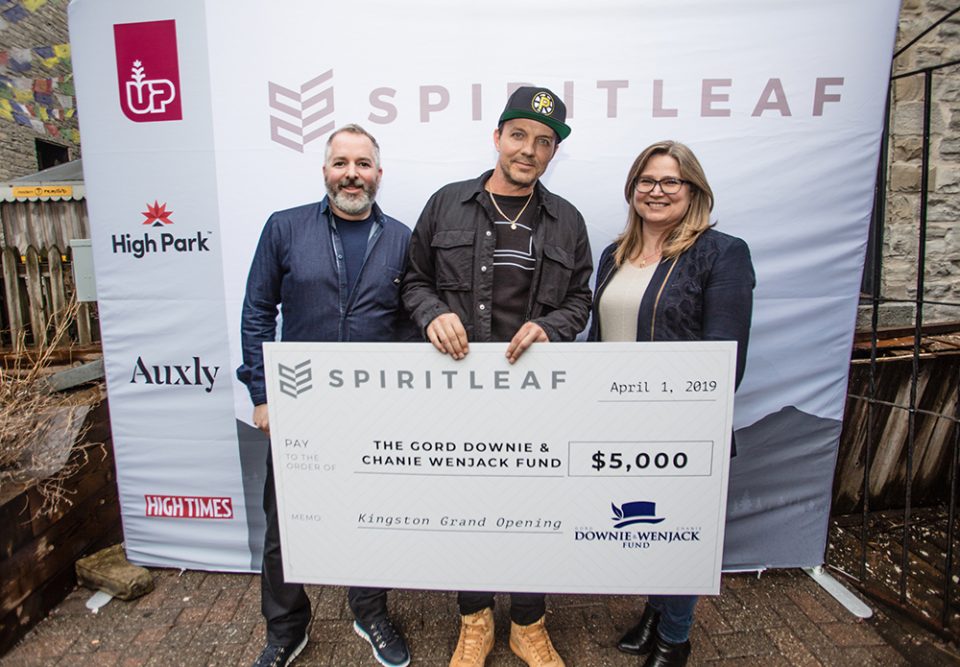Charitable giving might seem like an easy task if you run a franchise. After all, you’re looking to make a difference in people’s lives by donating money and resources to a cause. However, if you’re involved in a franchise like Spiritleaf, a recreational cannabis dispensary franchise, the challenges can be formidable.
“As a cannabis company, we’re in a highly regulated industry. In most parts of the country, in many of the regulated provinces, any kind of advertising or any type of charitable giving is quite difficult,” explains Darren Bondar, president and CEO of Inner Spirit Holdings Limited, which owns Spiritleaf.
So, the company created the Spirit Fund, its way to work within the regulations and give back to the communities where it operates. Through the Spirit Fund, Inner Spirit Holdings Ltd. announced its support of the Gord Downie & Chanie Wenjack Fund in 2018 with a five-year charitable commitment, as well as the establishment of a Gord Downie & Chanie Wenjack Fund Legacy Room.
The Legacy Room is a space created to help educate Canadians about the history of the residential schools and the story of Wenjack, who died of starvation and exposure after running away from a residential school in 1966. Before Tragically Hip frontman Gord Downie died of cancer in 2017, he became involved in creating awareness of Wenjack’s plight with an album and graphic novel called Secret Path.
“We got involved as one of the legacy members, the first member in Alberta to support the fund with a five-year, $25 thousand contribution,” explains Bondar. “That came about when we ended up getting together with Newstrike Cannabis (the parent company of Up Cannabis Inc.), now owned by Hexo. They had the Tragically Hip involved as one of their early investors and were involved in their creative process.
“We thought it was going to be an excellent way to recognize that partnership and Gord Downie’s contributions, and for us to be able to participate in indigenous reconciliation and provide awareness throughout our stores.”
Spiritleaf was founded in 2017 and started franchising soon after. By the end of 2019, 45 stores were to have opened, with plans to open 100 in total. Franchises can be found in British Columbia, Alberta, Saskatchewan, and Ontario.
“In all of our stores, we have Experiential Hubs – we provide information about the Gord Downie & Chanie Wenjack Fund. So, when you’re shopping through the store there is also this education component that we’re pretty proud of,” explains Bondar.
Franchise partners are very supportive of the charitable giving they’ve been involved with so far, says Bondar. “The fact we’re able to give back with the Spirit Fund and the Chanie Wenjack fund being our premier donation to date, I think all the franchise partners are really supportive and proud to be associated with it.”
At the opening of one of the first private retail cannabis stores in Kingston, Ontario on April 1, 2019, the company made its second installment of its five-year donation to the Gord Downie & Chanie Wenjack Fund. Bondar says the company has more plans for charitable giving, including expanding the Gord Downie & Chanie Wenjack Fund and working for cannabis-focused issues like cannabis amnesty.
Spiritleaf also planned to spend another $50 thousand by the end of 2019 in the various communities in which its franchises operate. “It’s just a matter of identifying the various projects we’re working on and ensuring they’re going to pass, that we’re not going to be offside Health Canada or provincial regulations in making these contributions,” says Bondar.
“In every community where we’re opening stores, we’re looking for places where we can do various things, whether it’s art installations or mural projects. We just want to educate and inspire and support the music, arts, and culture communities, so that’s what we’re focused on. As we build out the fund, we’ll be expanding the initiatives and the different things we can participate in,” explains Bondar.
Bondar says charitable giving is very important to Spiritleaf. “It’s been kind of our mantra since day one. We’re in a highly regulated, stigma-filled industry and we want to show that a lot of good can be done with it. If we can spread a little bit of peace, love, and harmony through what we’re doing selling cannabis, then we’ve really accomplished something.”
By Georgie Binks


